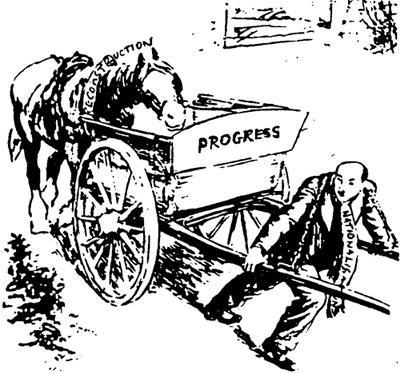


Are you sure you want to reset the form?
Your mail has been sent successfully
Are you sure you want to remove the alert?
Your session is about to expire! You will be signed out in
Do you wish to stay signed in?
The Labour government and nationalization
Study Sources A to D and then answer the questions that follow.
Source A: Putting the cart before the horse - a cartoon in Punch in 1949
The man pulling the cart is Clement Attlee, the Labour Prime Minister

Source B
| Extracts from a conversation between Attlee and a journalist, Francis Williams Williams: Had you a complete working pattern of policy in mind when you became Prime Minister? Attlee: Certainly. I was definitely determined to go ahead with plans of nationalisation. There was no difficulty with the Bank of England, Cable and Wireless, gas and electricity and there wasn't much with the mines. Transport was much more difficult and iron and steel had not been worked out.... There were a lot of problems to clear up but I felt we must push ahead. Nationalisation had to go ahead because it fell in with the essential planning of the country. It wasn't just nationalisation for nationalisation’s sake, but the policy in which we believed: that fundamental things - central banking, transport, fuel and power - must be taken over by the nation as an essential part of a planned economy - a basis on which the rest of reorganisation of the country would depend. There was the making of the health service, the co-ordination of all the various social services and the advance in education. All this could not be delayed. And there were practical things - building houses and many new factories.... Source: Quoted in F. Williams, A Prime Minister Remembers, Heinemann, 1961. |
Source C
| Extract from a speech by Winston Churchill, the Conservative leader, during the 1951 election campaign. Socialism, with its vast network of regulations and restrictions and its incompetent planning, is proving itself every day to be a dangerous and costly mistake. Every major industry which the socialists have nationalised, has passed from the profitable or self-supporting side of the balance-sheet to the loss-making side. Source: Quoted in A. Sked and C. Cook, Post-War Britain, Penguin, 1993 edn. |
Source D
| Historian C. J. Bartlett writes about nationalization. The case for the nationalisation of electricity and gas was strong. Neither, as organized, could undertake ambitious and co-ordinated modernisation programmes. There were over 500 separate electricity undertakings. Gas supply was even more disorganised and inefficient. The case for the nationalisation of the coalmines, the Bank of England, airways and railways was also good and could be justified on grounds other than socialism. All needed lots of capital that was unlikely to be provided by private enterprise. The major debate was over iron and steel. This industry was not obviously inefficient or short of capital, but it was clearly one of the ‘commanding heights of the economy’. Source: C. J. Bartlett, A History of Postwar Britain, Longman, 1977. |
